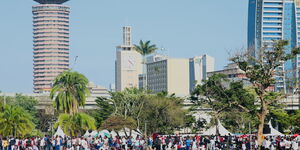Kenya is in talks with the United Arab Emirates’ national railway operator, Etihad Rail, to take over freight operations on the Standard Gauge Railway (SGR) under a concession arrangement.
The plan comes as the government seeks fresh ways to finance the next phase of the railway’s expansion from Naivasha to Kisumu and Malaba.
Transport Cabinet Secretary Davis Chirchir said the discussions involve Etihad Rail investing in rolling stock, locomotives, and wagons, and running freight services on the line once it is completed. The government would retain ownership of the railway infrastructure through Kenya Railways Corporation, which would continue to handle engineering and maintenance.
According to Chirchir, Etihad Rail is targeting freight volumes of about 17 million metric tonnes annually to break even or turn a profit. This threshold would justify the company’s investment in operating the freight side of the SGR and make the concession commercially viable.
Railway Line Extension
To fund the Ksh516.92 billion ($4 billion) needed for the extension, Kenya plans to securitise its railway development levy, a tariff charged at 2 percent of the value of all imports into the country. The Treasury currently collects about Ksh50 billion ($387 million) from the levy each year.
Securitisation would involve converting this predictable stream of future levy collections into an upfront lump sum by selling it to investors, allowing construction to proceed without adding traditional sovereign debt. “We’re seeking to allow securitisation of this levy and use it to raise funds,” Chirchir said in Nairobi.
The targeted expansion will link the existing SGR line from Naivasha to the lakeside city of Kisumu and on to Malaba at the Ugandan border, positioning the railway as a key regional trade corridor. #
The first phase of the SGR, completed in 2019, connected the port of Mombasa to Naivasha via Nairobi at a cost of Ksh646.15 billion ($5 billion).
The government says unbundling the railway industry, separating infrastructure ownership from operations, will help attract private investment and improve efficiency.
Under the proposed model, private operators like Etihad Rail would focus on running services while the state concentrates on maintaining the physical network.
If concluded, the deal with Etihad Rail would mark the first time Kenya’s SGR freight operations are managed by a foreign company. It would also signal a shift from the original approach, which relied heavily on Chinese financing and management.
The Ministry of Transport has also reached out to other international development lenders to finance infrastructure projects in the sector, with Chirchir noting that securing multiple streams of funding is crucial to sustaining the railway’s long-term operations.












